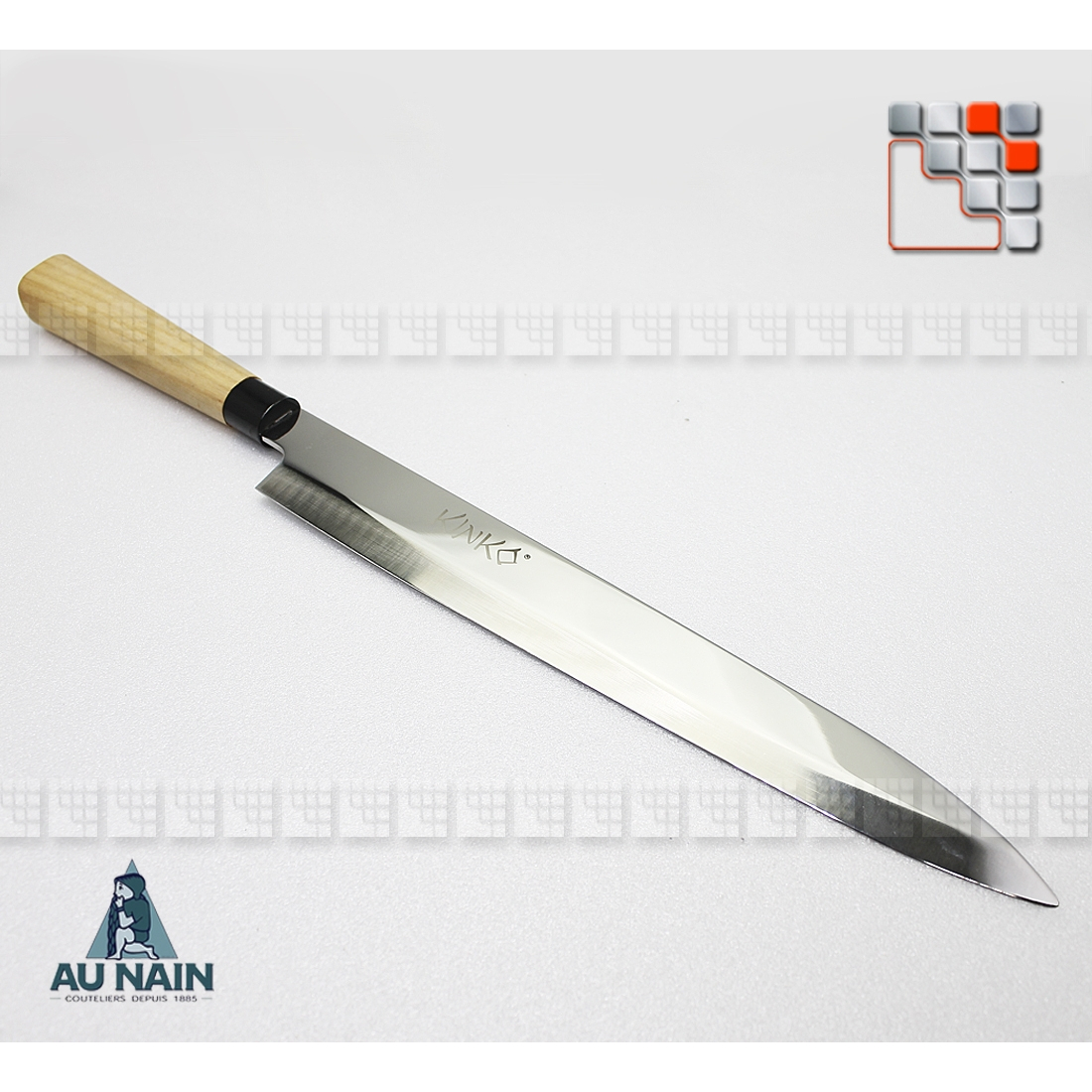Yanagiba KINKO Japanese Chef Knife (Left or right handed)
Japanese Chef's Knife Yanagiba KINKO (Left or right handed) AU NAIN

Secure payment

Shipping in 24 hours
Japanese Chef's Knife Yanagiba KINKO (Left or right handed) AU NAIN
Although many Japanese manufacturers have adapted their production to Western needs, Japanese knives feature a right or left beveled edge.
Blades with a "straight" edge. The beveled edge results from a sharpening done "halfway", that is to say that the blade has been sharpened on only one side.
Why? Because the symmetrical blade (sharpened on both sides) penetrates the food by spreading the fibers of the piece of food to be cut.
With the asymmetrical edge, the knife penetrates the food more delicately. This technique aims to keep all the flavor of the product. The Japanese created this type of blade because it is more suited to their cutting style. The disadvantage of this type of edge is that you have to choose the knife according to your preferred hand! Indeed, most asymmetrical blades are suitable for right-handed people.
This blade allows you to carry out certain types of culinary work, highly adapted to so-called Japanese cuts (woks, sushi, sashimi, etc.).
How to use beveled knives? Using this type of knife is a little different in that it is used with three fingers (middle, ring and little finger)!!! The idea is to cut with the shoulder and not the wrist.
The principle is simple, the cook pushes the knife into the food (for example salmon) then pulls it without going back and forth. The technique is not so easy to practice especially when the blades are long, because they tend to deviate. In many recipes from Japanese chefs, you will be recommended to use two deba knives (one in each hand) to chop cold meats evenly and cleanly. Which knives are concerned? It is now more and more common to find the beveled blade on many knives.
Knives made with this type of blade are:
- the santoku : the ultimate all-purpose knife! If you can only have one Japanese knife, choose this one. It is better to pay the price to have a single good all-purpose knife, rather than several mediocre knives. This type of Japanese knife will slice meat, fish or vegetables just as well. It is the knife to have in your kitchen
- The yanagiba , also called "sashimi knife", is characterized by its long blade (21 to 24 cm), quite thin and rigid. It is mainly used for cutting carpaccios, slices of salmon or in general, for working with fish.
- the deba : a knife with a pointed blade, short (17 cm) and quite wide with a relatively high weight. It is mainly used for cutting meat and in particular tartares.
- the nakiri : has an ambidextrous V-shaped blade. It allows you to make various cuts.
Short list of cuts in Japanese cuisine:
- Arare-giri (in small cubes)
- Sainome-giri (diced)
- Hangetsu-giri (half-moons)
- Tanzaku-giri (with chopsticks)
- Sasagaki (shavings)
- Sen-giri (in strips)
- Wa-giri (in slices)
- Hyoshigi (in strips)
- Hanagiri (flower-shaped)
When choosing a knife with a beveled blade, be careful!! The bevel is made for a right-handed person and not a left-handed person!!!
Starred chefs, butchers and fishmongers, hotel schools or individuals appreciate AU NAIN's top-of-the-range knives and utensils. Specialists also benefit from this know-how through ranges specially designed or adapted from professional ranges.









